#inaugural poet
Text

Excerpt from The Hill We Climb (2020) by Amanda Gorman
In Episode 167, Rachel takes us to the National Poetry Corner.
Rachel: Like, democracy, at its core, is people kind of fighting for what they want. And there’s been a lot of that lately, and it has been kind of gross, and, uh... that doesn’t mean, necessarily, that we’re broken forever. Y'know.
Griffin: Yeah. Do you have the line—the one that stood outto me, is the... being American is more than the pride we inherit. It’s the past we step into it and how we repair it.
Rachel: That’s exactly it!
Griffin: It’s fucking incred—I heard that line once this morning, and like, it stuck with me that hard.
If you’d like to hear more about the incredible value and importance of this poem and inauguration speech, you can do so here: The Christmas Crab, from 14:34 - 25:50
#poetry#rachel mcelroy#griffin mcelroy#poem#Amanda Gorman#poet#The Hill We Climb#writing#words#literature#inauguration#hope#politics#presidency#president#political art#USA#wonderful!#wonderful! podcast#rachel’s poetry corner#episode 167
6 notes
·
View notes
Text
Happy birthday, artist, and underground film icon, Marjorie Cameron! Here's some new art inspired by The Wormwood Star to celebrate!


#happy birthday#marjorie cameron#artist#poet#the wormwood star#the wormwood star 1956#street fair#high wide and handsome#night tide#night tide 1961#inauguration of the pleasure dome#experimental fiilm#kenneth anger#movie art#art#drawing#movie history#pop art#modern art#pop surrealism#cult movies#portrait#cult film
8 notes
·
View notes
Text
Cinema Therapy collab with Amanda Gorman??????????????
#youth poet laureate inaugural poet Amanda Gorman??????????#oh I’m gonna get punched in the chest with this episode#her writing is just. good lord.#everyone knows the hill we climb#and it’s amazing#and ALL of her work is that amazing
0 notes
Note
Do you ever think about how poetry has never been more irrelevant and unpopular in the English language than it is at this very moment?
I do not because it is not. Aside from being blatantly untrue, it is also a deeply anti-intellectual position. Poetry has always had and will always have relevance in our revolving, ailing society. At moments of individual or collective grief, rage, or joy, poetry is a constant companion. Think of Amanda Gorman's revolutionary reading at the most recent American presidential inauguration, or the way John Ashbery's Dream Song 29 has been woven into the titles and themes of Succession. Poetry is all around us, whether we are cognizant of its subtle rhythms or not.
Arguments about the decline of poetry's cultural importance are not new. Poets have been, across the centuries, making a case for the artform's relevance and immediacy, with poets acting as oracles, prophets, and keen observers of the human condition. Shelley said, "[the poet] not only intensely beholds the present as it is[...] but he beholds the future in its present[...]A poet participates in the eternal, the infinite, and the one." Miłosz titled his collection The Witness of Poetry as such, not, as he explained, "because we witness it, but because it witnesses us."
As the centuries drag on and horrors endure, so too does poetry. After the World Wars, there were those who felt it was impossible to write poetry in the 20th century because the extent of the devastation went so deep that it tainted the human soul, wherefrom all poetry emerges through the poet into the world in relation to humanity. Thus, how do we continue to write it, to read it? Because poetry allows us to endure, no - it mandates that we endure. Poems scrawled on paper scraps, in the dirt, on forgotten receipts, in the mortar of prison walls. Poems, even in their most simplistic form, do the work of expressing the truth they guard. And think, how many of us carry poems within ourselves that will be unspoken unto our deaths? As Miłosz wrote, “Man, pushed to the very limit of his condition, found once more in the written word a last rampart against the loneliness of annihilation.”
A poetry-less society is a dead one, without passion, conviction, or intention. Whitman's challenge "To have great poets, there must be great audiences, too" reads like an indictment of our increasingly anti-intellectual society, drunk on convenience and puerility. Indeed, Orwell wrote that after WWII, "one ought to recognize that the present political chaos is connected with the decay of language." Language and its use in a free society matters. Subsequently, if we are to retain any semblance of humanity at all, whether politically, morally, or intellectually, it must matter the most.
If you do not see poetry around you, then it is up to you seek it out; no one will provide beauty for you in this miserable society of ours - you must find it yourself.

514 notes
·
View notes
Text
In light of Fall Out Boy’s GARBAGE cover of the song. Let’s learn about the original. Notice how they’re actually in chronological order instead of just random references 😒😒😒😒
1949
Harry Truman was inaugurated as U.S. president after being elected in 1948 to his own term; previously he was sworn in following the death of Franklin D. Roosevelt. He authorized the use of atomic bombs on Hiroshima and Nagasaki in Japan during World War II, on August 6 and August 9, 1945, respectively.
Doris Day enters the public spotlight with the films My Dream Is Yours and It’s a Great Feeling as well as popular songs like “It’s Magic”; divorces her second husband.
Red China: The Communist Party of China wins the Chinese Civil War, establishing the People’s Republic of China.
Johnnie Ray signs his first recording contract with Okeh Records, although he would not become popular for another two years.
South Pacific, the prize-winning musical, opens on Broadway on April 7.
Walter Winchell is an aggressive radio and newspaper journalist credited with inventing the gossip column.
Joe DiMaggio and the New York Yankees go to the World Series five times in the 1940s, winning four of them.
1950
Joe McCarthy, the US Senator, gains national attention and begins his anti-communist crusade with his Lincoln Day speech.
Richard Nixon is first elected to the United States Senate.
Studebaker, a popular car company, begins its financial downfall.
Television is becoming widespread throughout Europe and North America.
North Korea and South Korea declare war after Northern forces stream south on June 25.
Marilyn Monroe soars in popularity with five new movies, including The Asphalt Jungle and All About Eve, and attempts suicide after the death of friend Johnny Hyde who asked to marry her several times, but she refused respectfully. Monroe would later (1954) be married for a brief time to Joe DiMaggio (mentioned in the previous verse).
1951
The Rosenbergs, Ethel and Julius, were convicted on March 29 for espionage.
H-Bomb is in the middle of its development as a nuclear weapon, announced in early 1950 and first tested in late 1952.
Sugar Ray Robinson, a champion welterweight boxer.
Panmunjom, the border village in Korea, is the location of truce talks between the parties of the Korean War.
Marlon Brando is nominated for the Academy Award for Best Actor for his role in A Streetcar Named Desire.
The King and I, musical, opens on Broadway on March 29.
The Catcher in the Rye, a controversial novel by J. D. Salinger, is published.
1952
Dwight D. Eisenhower is first elected as U.S. president, winning by a landslide margin of 442 to 89 electoral votes.
The vaccine for polio is privately tested by Jonas Salk.
England’s got a new queen: Queen Elizabeth II succeeds to the throne upon the death of her father, George VI, and is crowned the next year.
Rocky Marciano defeats Jersey Joe Walcott, becoming the world Heavyweight champion.
Liberace has a popular 1950s television show for his musical entertainment.
Santayana goodbye: George Santayana, philosopher, essayist, poet, and novelist, dies on September 26.
1953
Joseph Stalin dies on March 5, yielding his position as leader of the Soviet Union.
Georgy Maksimilianovich Malenkov succeeds Stalin for six months following his death. Malenkov had presided over Stalin’s purges of party “enemies”, but would be spared a similar fate by Nikita Khrushchev mentioned later in verse.
Gamal Abdel Nasser acts as the true power behind the new Egyptian nation as Muhammad Naguib’s minister of the interior.
Sergei Prokofiev, the composer, dies on March 5, the same day as Stalin.
Winthrop Rockefeller and his wife Barbara are involved in a highly publicized divorce, culminating in 1954 with a record-breaking $5.5 million settlement.
Roy Campanella, an African-American baseball catcher for the Brooklyn Dodgers, receives the National League’s Most Valuable Player award for the second time.
Communist bloc is a group of communist nations dominated by the Soviet Union at this time. Probably a reference to the Uprising of 1953 in East Germany.
1954
Roy Cohn resigns as Joseph McCarthy’s chief counsel and enters private practice with the fall of McCarthy. He also worked to prosecute the Rosenbergs, mentioned earlier.
Juan Perón spends his last full year as President of Argentina before a September 1955 coup.
Arturo Toscanini is at the height of his fame as a conductor, performing regularly with the NBC Symphony Orchestra on national radio.
Dacron is an early artificial fiber made from the same plastic as polyester.
Dien Bien Phu falls. A village in North Vietnam falls to Viet Minh forces under Vo Nguyen Giap, leading to the creation of North Vietnam and South Vietnam as separate states.
“Rock Around the Clock” is a hit single released by Bill Haley & His Comets in May, spurring worldwide interest in rock and roll music.
1955
Albert Einstein dies on April 18 at the age of 76.
James Dean achieves success with East of Eden and Rebel Without a Cause, gets nominated for an Academy Award for Best Actor, and dies in a car accident on September 30 at the age of 24.
Brooklyn’s got a winning team: The Brooklyn Dodgers win the World Series for the only time before their move to Los Angeles.
Davy Crockett is a Disney television miniseries about the legendary frontiersman of the same name. The show was a huge hit with young boys and inspired a short-lived “coonskin cap” craze.
Peter Pan is broadcast on TV live and in color from the 1954 version of the stage musical starring Mary Martin on March 7. Disney released an animated version the previous year.
Elvis Presley signs with RCA Records on November 21, beginning his pop career.
Disneyland opens on July 17, 1955 as Walt Disney’s first theme park.
1956
Brigitte Bardot appears in her first mainstream film And God Created Woman and establishes an international reputation as a French “sex kitten”.
Budapest is the capital city of Hungary and site of the 1956 Hungarian Revolution.
Alabama is the site of the Montgomery Bus Boycott which ultimately led to the removal of the last race laws in the USA. Rosa Parks and Martin Luther King, Jr figure prominently.
Nikita Khrushchev makes his famous Secret Speech denouncing Stalin’s “cult of personality” on February 25.
Princess Grace Kelly releases her last film, High Society, and marries Prince Rainier III of Monaco.
Peyton Place, the best-selling novel by Grace Metalious, is published. Though mild compared to today’s prime time, it shocked the reserved values of the 1950s.
Trouble in the Suez: The Suez Crisis boils as Egypt nationalizes the Suez Canal on October 29.
1957
Little Rock, Arkansas is the site of an anti-integration standoff, as Governor Orval Faubus stops the Little Rock Nine from attending Little Rock Central High School and President Dwight D. Eisenhower deploys the 101st Airborne Division to counteract him.
Boris Pasternak, the Russian author, publishes his famous novel Doctor Zhivago.
Mickey Mantle is in the middle of his career as a famous New York Yankees outfielder and American League All-Star for the sixth year in a row.
Jack Kerouac publishes his first novel in seven years, On the Road.
Sputnik becomes the first artificial satellite, launched by the Soviet Union on October 4, marking the start of the space race.
Chou En-Lai, Premier of the People’s Republic of China, survives an assassination attempt on the charter airliner Kashmir Princess.
Bridge on the River Kwai is released as a film adaptation of the 1954 novel and receives seven Academy Awards, including Best Picture.
1958
Lebanon is engulfed in a political and religious crisis that eventually involves U.S. intervention.
Charles de Gaulle is elected first president of the French Fifth Republic following the Algerian Crisis.
California baseball begins as the Brooklyn Dodgers and New York Giants move to California and become the Los Angeles Dodgers and San Francisco Giants. They are the first major league teams west of Kansas City.
Charles Starkweather Homicide captures the attention of Americans, in which he kills eleven people between January 25 and 29 before being caught in a massive manhunt in Douglas, Wyoming.
Children of Thalidomide: Mothers taking the drug Thalidomide had children born with congenital birth defects caused by the sleeping aid and antiemetic, which was also used at times to treat morning sickness.
1959
Buddy Holly dies in a plane crash on February 3 with Ritchie Valens and The Big Bopper, in a day that had a devastating impact on the country and youth culture. Joel prefaces the lyric with a Holly signature vocal hiccup: “Uh-huh, uh-huh.”
Ben-Hur, a film based around the New Testament starring Charlton Heston, wins eleven Academy Awards, including Best Picture.
Space Monkey: Able and Miss Baker return to Earth from space aboard the flight Jupiter AM-18.
The Mafia are the center of attention for the FBI and public attention builds to this organized crime society with a historically Sicilian-American origin.
Hula hoops reach 100 million in sales as the latest toy fad.
Fidel Castro comes to power after a revolution in Cuba and visits the United States later that year on an unofficial twelve-day tour.
Edsel is a no-go: Production of this car marque ends after only three years due to poor sales.
1960
U-2: An American U-2 spy plane piloted by Francis Gary Powers was shot down over the Soviet Union, causing the U-2 Crisis of 1960.
Syngman Rhee was rescued by the CIA after being forced to resign as leader of South Korea for allegedly fixing an election and embezzling more than US $20 million.
Payola, illegal payments for radio broadcasting of songs, was publicized due to Dick Clark’s testimony before Congress and Alan Freed’s public disgrace.
John F. Kennedy beats Richard Nixon in the November 8 general election.
Chubby Checker popularizes the dance The Twist with his cover of the song of the same name.
Psycho: An Alfred Hitchcock thriller, based on a pulp novel by Robert Bloch and adapted by Joseph Stefano, which becomes a landmark in graphic violence and cinema sensationalism. The screeching violins heard briefly in the background of the song are a trademark of the film’s soundtrack.
Belgians in the Congo: The Republic of the Congo (Leopoldville) was declared independent of Belgium on June 30, with Joseph Kasavubu as President and Patrice Lumumba as Prime Minister.
1961
Ernest Hemingway commits suicide on July 2 after a long battle with depression.
Adolf Eichmann, a “most wanted” Nazi war criminal, is traced to Argentina and captured by Mossad agents. He is covertly taken to Israel where he is put on trial for crimes against humanityin Germany during World War II, convicted, and hanged.
Stranger in a Strange Land, written by Robert A. Heinlein, is a breakthrough best-seller with themes of sexual freedom and liberation.
Bob Dylan is signed to Columbia Records after a New York Times review by critic Robert Shelton.
Berlin is separated into West Berlin and East Berlin, and from the rest of East Germany, when the Berlin Wall is erected on August 13 to prevent citizens escaping to the West.
The Bay of Pigs Invasion fails, an attempt by United States-trained Cuban exiles to invade Cuba and overthrow Fidel Castro.
1962
Lawrence of Arabia: The Academy Award-winning film based on the life of T. E. Lawrence starring Peter O’Toole premieres in America on December 16.
British Beatlemania: The Beatles, a British rock group, gain Ringo Starr as drummer and Brian Epstein as manager, and join the EMI’s Parlophone label. They soon become the world’s most famous rock band, with the word “Beatlemania” adopted by the press for their fans’ unprecedented enthusiasm. It also began the British Invasion in the United States.
Ole’ Miss: James Meredith integrates the University of Mississippi
John Glenn: Flew the first American manned orbital mission termed “Friendship 7” on February 20.
Liston beats Patterson: Sonny Liston and Floyd Patterson fight for the world heavyweight championship on September 25, ending in a first-round knockout. This match marked the first time Patterson had ever been knocked out and one of only eight losses in his 20-year professional career.
1963
Pope Paul VI: Cardinal Giovanni Montini is elected to the papacy and takes the papal name of Paul VI.
Malcolm X makes his infamous statement “The chickens have come home to roost” about the Kennedy assassination, thus causing the Nation of Islam to censor him.
British politician sex: The British Secretary of State for War, John Profumo, has a relationship with a showgirl, and then lies when questioned about it before the House of Commons. When the truth came out, it led to his own resignation and undermined the credibility of the Prime Minister.
JFK blown away: President John F. Kennedy is assassinated on November 22 while riding in an open convertible through Dallas.
1965
Birth control: In the early 1960s, oral contraceptives, popularly known as “the pill”, first go on the market and are extremely popular. Griswold v. Connecticut in 1965 challenged a Connecticut law prohibiting contraceptives. In 1968, Pope Paul VI released a papal encyclical entitled Humanae Vitae which declared artificial birth control a sin.
Ho Chi Minh: A Vietnamese communist, who served as President of Vietnam from 1954–1969. March 2 Operation Rolling Thunder begins bombing of the Ho Chi Minh Trail supply line from North Vietnam to the Vietcong rebels in the south. On March 8, the first U.S. combat troops, 3,500 marines, land in South Vietnam.
1968
Richard Nixon back again: Former Vice President Nixon is elected President in 1968.
1969
Moonshot: Apollo 11, the first manned lunar landing, successfully lands on the moon.
Woodstock: Famous rock and roll festival of 1969 that came to be the epitome of the counterculture movement.
1974–75
Watergate: Political scandal that began when the Democratic National Committee’s headquarters at the Watergate office complex in Washington, DC was broken into. After the break-in, word began to spread that President Richard Nixon (a Republican) may have known about the break-in, and tried to cover it up. The scandal would ultimately result in the resignation of President Nixon, and to date, this remains the only time that anyone has ever resigned the United States Presidency.
Punk rock: The Ramones form, with the Sex Pistols following in 1975, bringing in the punk era.
1976–77
(An item from 1977 comes before three items from 1976 to make the song scan.)
Menachem Begin becomes Prime Minister of Israel in 1977 and negotiates the Camp David Accords with Egypt’s president in 1978.
Ronald Reagan was elected President of the United States in 1980, but he first attempted to run for the position in 1976.
Palestine: a United Nations resolution that calls for an independent Palestinian state and to end the Israeli occupation.
Terror on the airline: Numerous aircraft hijackings take place, specifically, the Palestinian hijack of Air France Flight 139 and the subsequent Operation Entebbe in Uganda.
1979
Ayatollah’s in Iran: During the Iranian Revolution of 1979, the West-backed and secular Shah is overthrown as the Ayatollah Ruhollah Khomeini gains power after years in exile and forces Islamic law.
Russians in Afghanistan: Following their move into Afghanistan, Soviet forces fight a ten-year war, from 1979 to 1989.
1983
Wheel of Fortune: A hit television game show which has been TV’s highest-rated syndicated program since 1983.
Sally Ride: In 1983 she becomes the first American woman in space. Ride’s quip from space “Better than an E-ticket”, harkens back to the opening of Disneyland mentioned earlier, with the E-ticket purchase needed for the best rides.
Heavy metal suicide: In the 1980s Ozzy Osbourne and the bands Judas Priest and Metallica were brought to court by parents who accused the musicians of hiding subliminal pro-suicide messages in their music.
Foreign debts: Persistent U.S. trade deficits
Homeless vets: Veterans of the Vietnam War, including many disabled ex-military, are reported to be left homeless and impoverished.
AIDS: A collection of symptoms and infections in humans resulting from the specific damage to the immune system caused by infection with the human immunodeficiency virus (HIV). It is first detected and recognized in the 1980s, and was on its way to becoming a pandemic.
Crack cocaine use surged in the mid-to-late 1980s.
1984
Bernie Goetz: On December 22, Goetz shot four young men who he said were threatening him on a New York City subway. Goetz was charged with attempted murder but was acquitted of the charges, though convicted of carrying an unlicensed gun.
1988
Hypodermics on the shore: Medical waste was found washed up on beaches in New Jersey after being illegally dumped at sea. Before this event, waste dumped in the oceans was an “out of sight, out of mind” affair. This has been cited as one of the crucial turning points in popular opinion on environmentalism.
1989
China’s under martial law: On May 20, China declares martial law, enabling them to use force of arms against protesting students to end the Tiananmen Square protests.
Rock-and-roller cola wars: Soft drink giants Coke and Pepsi each run marketing campaigns using rock & roll and popular music stars to reach the teenage and young adult demographic.
Short summaries of all 119 references mentioned in the song, you’re welcome.
#look fall out boy is one of my fave bands but this is inexcusable#fall out boy#Billy Joel#music#Spotify
291 notes
·
View notes
Note
Forgive me if this is a foolish question, but would you happen to know if there’s any sources out there on historical prayer behaviors? IE body position, gestures, etc. I don’t come from a religious background, so I struggle to know to go about praying even when I know what I want to say
Gestures and actions during Irish/Gaelic Pagan prayer.
This is not a foolish question at all! In fact it is a great one. Honestly finding the right words is the hardest part. There is little in the way of documented proof of how pre christian Gaels prayed so reconstruction is necessary. This makes it tricky to find authentic sources, thankfully there is a few practice's we can reconstruct with a lot of certainty. (Sources in bracketed links)
Clockwise/Deiseal movement
The act of moving in a circle in a clockwise direction (deiseal) is frequently seen to be auspicious and is used in many Irish Christian rituals. Many of these practices are still done today, especially at holy wells or other pilgrimage sites such at the various stations on Croagh Patrick (link). The opposite of this is anti-clockwise or Tuathal is frequently used in curses. This is a recurring theme throughout Irish and Scottish folklore and has been argued to be partially of a pre Christian origin(Link to book containing a chapter on the topic specifically chapter 10)
This is usually done at Holy Wells while doing the rosary. The well itself or an object near it like a statue, rock or tree is encircled by the worshiper usually 3 or 7 times while reciting the rosary. (link)(link)(link). And is a still living practice.
This clockwise movement was also used in medieval rituals, with supposedly in the Book of Fenagh, an inauguration ritual is described where a bell shrine was walked around a king and his solders clockwise. (in book chapter 10).
The use of the word deiseal and its association with blessing led it in the past to be an equivalent to "bless you" after a sneeze. (link). The sunwise or clockwise direction is synonymous with blessings.
Head down, eyes up
The Carmina Gadelica contains a number of prayers from gaelic scotland. Many of which follow a standard christian practice and just as many are situational in nature like to be said while washing ones hands, however certain ones stand out as being representative of a greater traditions of actions due to their unusualness.
References to raising ones eyes (link) and leaving the palms open and outstretched are mentioned (link page 290)
Both women and men were said to curtsey with men doing a bowing motion much like a curtsey in that it involved the bending of the left knee to the side and the right one straight as a show of respect (link)
To summarise with a quote:
"So the lifting of hands, raising of the eyes, and the bowing of the head are all actions that could be done during our prayers. In raising our hands we show a gesture of giving, just as we ‘give’ prayers of thanks, or blessing, or whatever other purpose we might be praying for, especially since there seems to be a since that we’re meant to raise the palms up to the sky (or moon, more to the point) instead of simply holding our hands out, palms up. It’s less a gesture that might suggest we’re asking for a handout than it gives a sense that we’re reaching out."
-An Introduction To Gaelic Polytheism by Marissa Hegarty
Curse pose
While not involved with worship, poets when preforming a satire, often magical in nature were said to stand on one foot, with one eye closed, holding up one hand, and sometimes speaking with one breath. This seems to specifically used for cursing however.
What to incorporate into your pagan practice
I would then recommend that while praying, walking in a circle in a clockwise direction with a bowed head, eyes up, while holding out your hands with the palms skyward would be appropriate. I like to have one hand over the other. After the prayer has concluded a curtsey should be done.
If anyone else has anything to add please do so with what gestures and actions you take during prayers. I hope this answers your question and that it was at all helpful.
#mine#ceist#draíocht#gaelic paganism#celtic paganism#irish paganism#irish polytheism#gaelic polytheism#celtic polytheism#pagan#magic#prayer#paganism#witch#witchblr#research based paganism#please anyone share how you do it#sometimes a direction can be so important to someone that person is me#resources#gaelpol#also check out the two books ive linked#celtic#ireland#scotland#if anyone can source any examples from irish mythology or early lit that would be great#ive seen someone stuff but i can't source it so I did not include#especially deiseal related stuff
85 notes
·
View notes
Text
Poetry for ALL
Some personal anecdotes and a plea follow...
As quite a few of you know, I’ve been engaged in disability awareness and rights campaigning and other work since sometime in the 90s, so when I was given an opportunity to support and host an event dedicated to making performance poetry as accessible as possible in 2018, I jumped on it.

(image description in alt text)
Poetry for All is the brainchild (and heartchild, and soulchild) of Rose Drew, who I first met through one of Richard Tyrone Jones’s Utter events in London. She’s an extraordinary writer and performer, and a powerhouse of an events host and organiser. Within about 30 seconds of watching her on stage, I knew I wanted to be like her when I grew up as an artist. When she got in touch three years later to ask if I’d like to help out with what turned out to be the inaugural event, I threw myself into providing as much support as possible with enthusiastic abandon, and we pulled together a line-up which included the extraordinary performers Raymond Antrobus and DL Williams (“DeafFirefly”), both of whom I’d performed with before and was keen to see again.
Now, there’s a whole section on our new website about the history of the events where you can read the facts, but I want to say here that, personally, that first event in March 2018 (coincidentally on my birthday!) was an absolute eye-opener – seeing how poetry events could expand and develop the ideal of accessibility in ways I hadn’t considered. It was also extremely inspirational as I realised that, well, I was allowed to write about my disabilities. Seeing and hearing artist after artist sharing so much and so eloquently unlocked something in me that I didn’t even know I’d been repressing:
I’m allowed to be an openly disabled poet. I’m allowed to express my neurodivergence. I can tell my truth. 😱🤯
Bit of a culture-shock, but I owe so much to the poets and to Rose (and to Dave Wycherley, BSL interpreter extraordinaire – that’s a hard and physically/ mentally taxing job as it is, but to do that with poetry? on the fly?! breathtaking...) for helping me get to that starting point, knocking down the walls of my own internalised ableism.
So, apart from a paean to self-expression and why representation and finding tribe matters, and a screed of gratitude for new friends made and old friendships strengthened through the course of these events, why am I writing this? What’s with the hashtag? “Plea...?”
Well, so far, since you ask, all of our events have had local funding in York, where they’ve taken place exclusively so far. Rose applied for Arts Council England funding for this and next year for a tour comprising several venues and a host more disabled artists and BSL interpreters from various parts of the UK (all getting paid properly!), but we found out last week that we’d not got the money. Any of it. So our forthcoming event on 24th November in the gorgeous National Centre for Early Music is in jeopardy and, since the thought of Rose (herself a disabled artist on low wages) having to pay for this out of her own pocket was not to be supported, I threw myself at a plan of creating a (somewhat last-minute) Crowdfunder, so that we can at least pay for the venue, the artists’ and interpreters’ fees, the travel and accommodation expenses of those of us coming from out of town, and the costs of producing merchandise to sell. We’ll be producing an anthology in print and ebook form, as a joint publication between indie publishers Stairwell Books and Allographic Press. And, if we exceed our funding goal, there’ll be video and audio available of the event to boot!
We’ve created a frankly very exciting range of pledge rewards for people wanting to support us (all the way from £1 and £2 options, since money is tight, especially for disabled folk, right now, to more chunky ones like private mentoring, workshops, and a publishing package), and we’ve got three weeks(!) to raise our £1,500 to cover the shortfall from ticket and merch sales. Eeep! So, if you’re able to and would like to help us, we’d be ever so grateful. The campaign is here:
https://www.crowdfunder.co.uk/p/poetry-for-all-2023-fundraiser
And if you have absolutely no funds to share with us at all, we’d be incredibly grateful if you shared on social media, with friends, on blogs, all of that!
Thanks for reading all this, and have a great day!
#fay speaks#image#image description#disability#disability awareness#accessibility#fundraiser#crowdfunder#poetry for all#I am going to be posting about this a LOT!#accessible events#accessibility matters#respresentation matters#fundraising
99 notes
·
View notes
Text


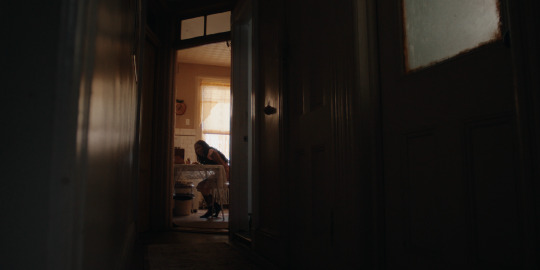


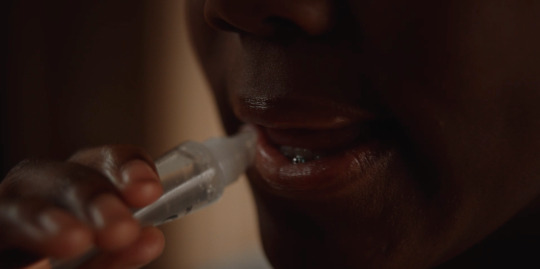
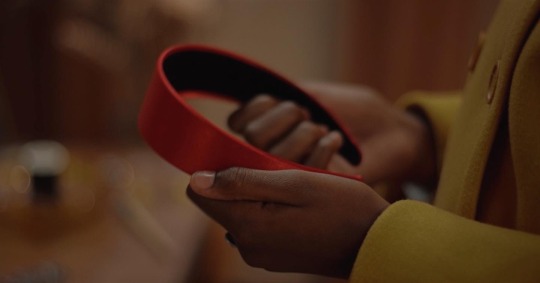
Dress Rehearsal (2023) 🎞️✨
A short yet impactful piece inspired by Amanda Gorman, who, in 2021, was named the youngest inaugural poet.
The film captures the curiosity and creative imagination of a young Black girl filled with aspirations.
Directed by Josef Adamu.
83 notes
·
View notes
Text
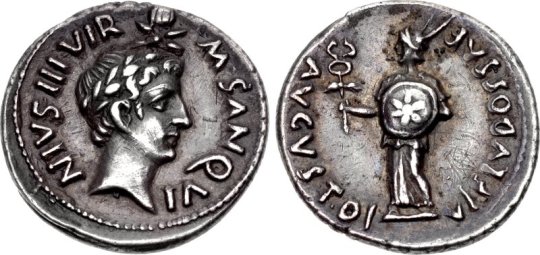
Denarius minted in 17 BCE by Marcus Sanquinius, one of the IIIviri monetales, to mark Augustus' holding of the Ludi Saeculares (Secular Games). On the obverse, the bust of the deified Julius Caesar; above his head is the comet seen after his assassination that was thought to mark his ascent to the gods. On the reverse, the herald of the Secular Games, in a costume evocative of the divine herald Mercury, including the caduceus.
The Secular Games were ostensibly held every 110 years, this period having been set by Etruscan soothsayers as the farthest limit of a human lifespan. Civil war prevented the holding of the regularly scheduled Games in 46 BCE; after Augustus became sole ruler, he chose 17 BCE to inaugurate a new Golden Age (saeculum aureum). The Games began with three days of prayer and sacrifice by Augustus and M. Agrippa, held both by day and by night. The daylight sacrifices were to Olympian deities (Jupiter, Juno, and Apollo/Diana), while the nighttime sacrifices honored deities with chthonic associations (the Moerae [Fates], the Ilythiae [goddesses of childbirth], and Terra Mater {Mother Earth]). The poet Horace composed a hymn for the occasion, the Carmen Saeculare, which was performed by choirs of boys and girls on the Palatine and then on the Capitoline. This event had several purposes: it celebrated peace and prosperity after many years of civil war; it advanced Augustus' program of religious reform and a return to the "old ways"; and it made absolutely clear that Augustus himself was the foremost figure in Roman state religion--not only in his official capacity as pontifex maximus, but by virtue of his close association (if not identification) with Palatine Apollo. The overall template would be used again by Domitian (88 CE) and Septimius Severus (204 CE), but Constantine declined to hold the Games in 314, bringing them to an end.
Photo credit: Classical Numismatic Group, Inc. http://www.cngcoins.com
#classics#tagamemnon#Ancient Rome#Roman Empire#ancient history#Roman history#Secular Games#Ludi Saeculares#Roman religion#Ancient Roman religion#religio Romana#art#art history#ancient art#Roman art#Ancient Roman art#Roman Imperial art#coins#ancient coins#Roman coins#Ancient Roman coins#denarius#metalwork#silver#silverwork#numismatics#ancient numismatics
89 notes
·
View notes
Note
Hi! I’m Sephardic, specifically the kind that was from Portugal and then went to Amsterdam around 1493. I went through your blog but didn’t see anything from this community specifically. Do you have any photos of them? I have one thing from that side of the family, a small gold hamsa with a tiny green emerald in the middle from my grandmother and it was her grandmother’s. But would love to learn more. Thanks so much for all you do!
In the late 15th century, Spain and Portugal expelled their large Jewish population and many Jews found refuge in the Balkans and North Africa. However, as the political situation across Europe shifted, new opportunities for Jewish settlement materialized, particularly Holland, which emerged from the 80 year Wars of Spanish Succession as an independent nation in 1648.
Article XIII of the Treaty of Utrecht, which ratified the union of the northern provinces, declared that no one was to be prosecuted for his religious beliefs. This clause provided the legal basis upon which Jews immediately began to take up residence and seek recognition in Holland. In 1604 a certain Manuel Rodrigues de Vega petitioned the city’s burgomasters to be allowed to establish silk mills there along with two other Portuguese Jews. Eventually, Sephardic poets, dramatists, calligraphers and copper-etchers would also be found alongside the customary merchants, bankers, and physicians.
Many Dutch intellectuals became fascinated with the somewhat exotic inhabitants of the Jewish quarter and sought them out for conversation. Conversely, the Sephardic Jews reaped the benefits of the lively intellectual life created by Amsterdam’s savants, who eagerly cultivated theology, philosophy, jurisprudence, mathematics and oriental languages.
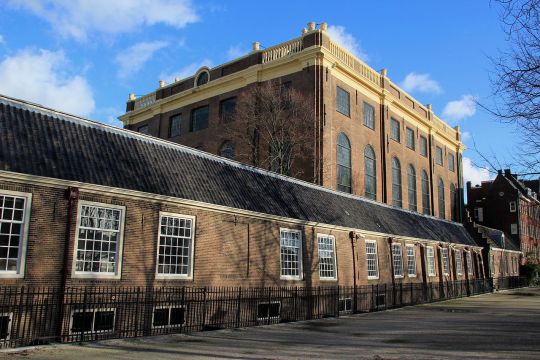
This is a photo of the old Portuguese synagogue in Amsterdam.
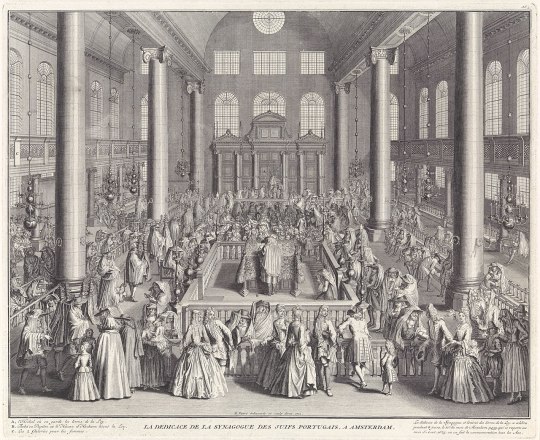
This lithograph by Bernard Picart shows its inauguration in 1675.
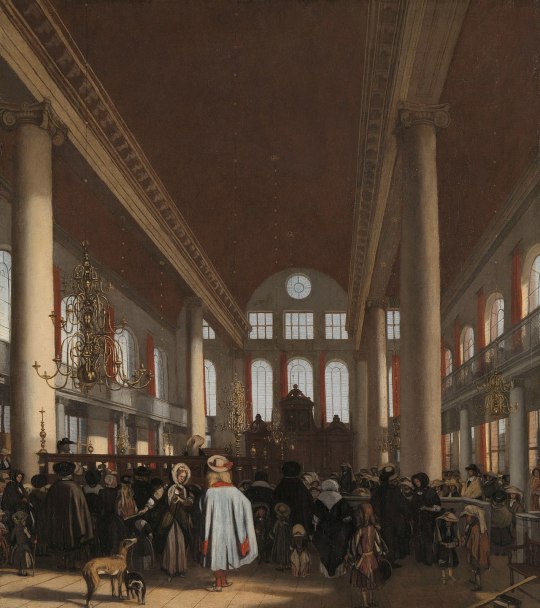
The painting of Emanuel de Witte depicts the interior of the synagogue in 1680. The Amsterdam Sephardic community was one of the largest and richest Jewish communities in Europe during the Dutch Golden Age, and their very large synagogue reflected this. The synagogue remains an active place of worship and is also a popular tourist attraction.
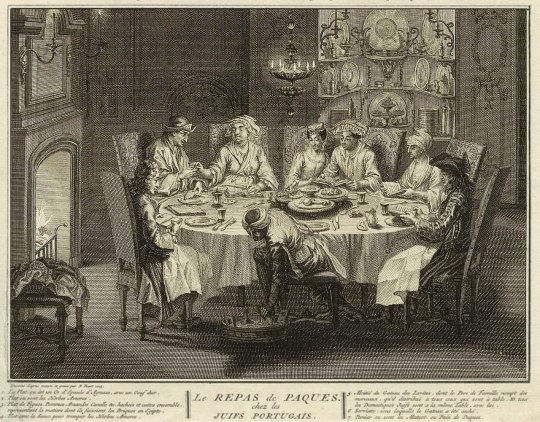
This is, again by Picart, a depiction of the Passover Seder of the Portuguese Jews of Amsterdam.
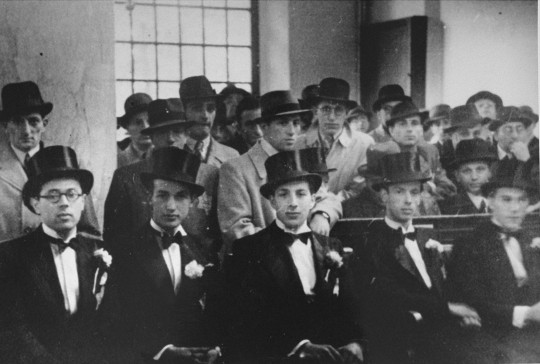
These are male attendants at a Sephardic wedding in Amsterdam in 1942, shortly before the German occupiers murdered most of the community.
71 notes
·
View notes
Text
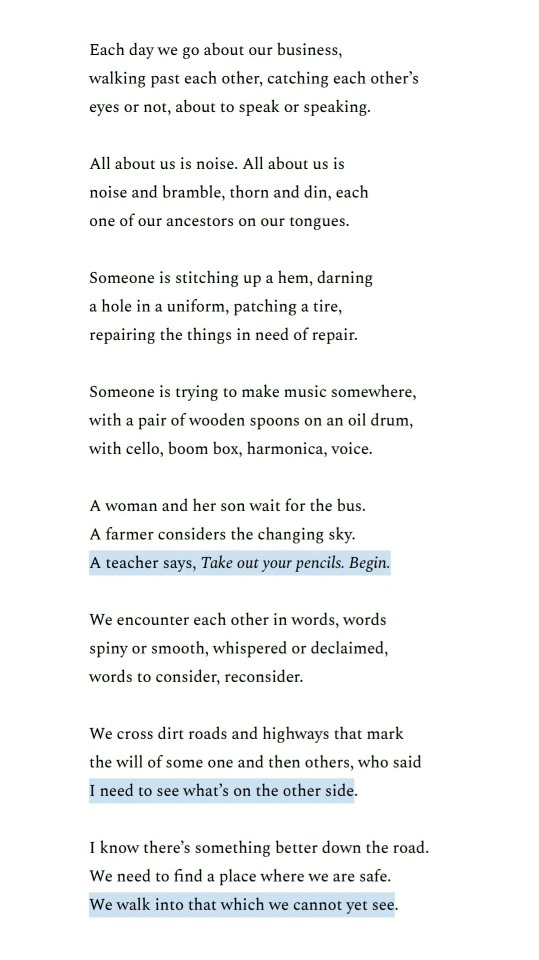
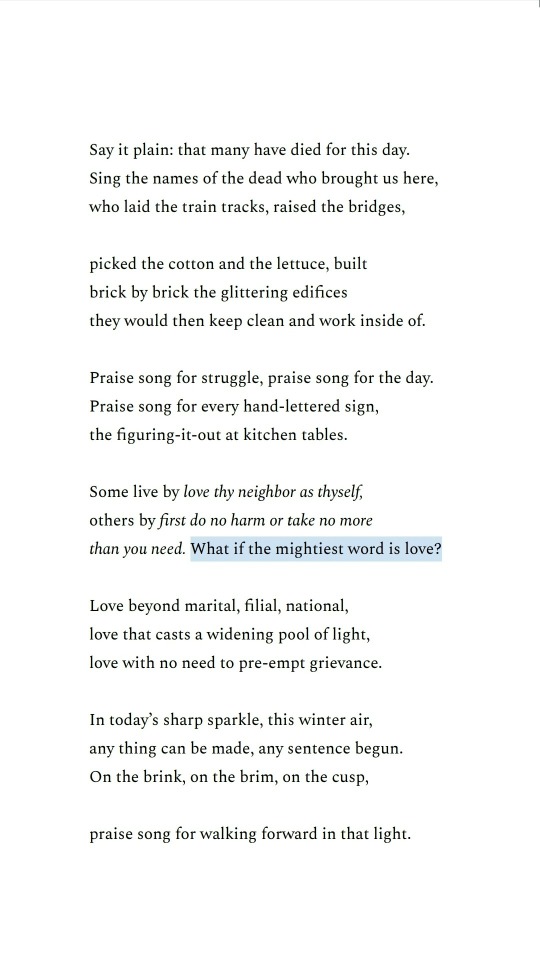
Praise Song For The Day (2009) by Elizabeth Alexander
In Episode 270, Rachel shares another inaugural poem!
Rachel: Like, I love being hopeful.
Griffin: Sure!
Rachel: Which is probably not unique to me. [laughs] But I am always willing to fall for it. Like, you put the right words together, I'm like, “Yes! Yes! Things are going to be better!”
If you’d like to hear about Alexander's poem, you can do so here: Harma and Reg, from 6:00 - 18:20
#poetry#rachel mcelroy#griffin mcelroy#poem#Elizabeth Alexander#poet#Praise Song For The Day#writing#words#literature#hope#people#inaugural poem#inauguration#politics#this american life#united states of america#country#government#USA#barack obama#obama presidency#wonderful!#wonderful! podcast#rachel’s poetry corner#episode 270
1 note
·
View note
Text
"A vigorous debate about the ideal qualities that the New Woman ought to represent took place on the pages of the Seitō (Bluestocking), a journal begun in September 1911 by Hiratsuka Raichō, who chose for its title a name linked closely in the public mind with militant international feminism. ... Hiratsuka greeted readers to the inaugural issue with a stirring allusion to Japan's most important progenitor deity, the Sun Goddess Amaterasu:
In the beginning, woman was the sun
An authentic person
Today, she is the moon
Living through others
Reflecting the brilliance of others
And now "Bluestocking", a journal created for the first time with the brains and hands of today's Japanese women, raises its voice.
... One of the voices featured in the magazine belonged to the famous poet Yosano Akiko, who graced the first issue with a verse that was to inspire generations of women, both in Japan and internationally.
The day the mountains move has come.
I speak, but no one believes me
For a time, the mountains have been asleep
But long ago they all danced with fire.
It doesn't matter if you believe this,
My friends, as long as you believe:
All the sleeping women
Are now awake and moving."
James McClain, Japan, A Modern History, 2002
24 notes
·
View notes
Text
Phic Phight Prompt: Kwan starts a poetry club and invites everyone at school to the first monthly poetry slam. Some unexpected poets show up.
Word Count: 1881
For TheSilentBard
Summary: When Kwan revives the old poetry club he gets a bigger crowd than expected. Danny's sure no one is going to forget this meeting, especially not Mr. Lancer.
The club room is full to bursting, students - some excited, but most reluctantly - occupying each of the cheap chairs scattered almost haphazardly around the place. Slouched in one of the back corners, Danny watches Mr. Lancer pick his way through the messy array of seats to get to the front of the room with a dead-eyed stare.
"Excuse me, pardon me, please don't leave your - oof!" The teacher trips and nearly falls, barely catching himself on the back of a chair instead of braining himself on it and all Danny can muster the energy for at the sight is a slow blink. "Lord of the Flies, Mr. Baxter! Do be more careful with where you rest your feet!"
Closing his eyes even if he knows he can't sleep here Danny hears a snort which could only come from Sam. Technically, unlike him and Tucker, she isn't required to attend the club session for a chance at extra credit because she's acing the class.
"It hasn't started yet." Tucker points out helpfully, stylus still tap tap tapping away at his PDA. "You could leave. If you actually wanted to."
The teasing barb hits its mark once again and Sam slouches further into her seat with a tsk.
"I'm here to watch how hard this bombs." In her pause for emphasis, Danny can almost hear her rolling her eyes. "I haven't wasted fifteen minutes of my afternoon just to leave before the show even starts."
"So you admit that you're attending the new poetry club for fun." Tucker snipes, smile clear in his voice. There's a scuffle over Danny's head as Tucker ducks whatever Sam threw in retaliation. Used to it and too tired to participate, Danny slumps down until his head is resting on the back of his chair. The smooth plastic is uncomfortable and his spine is already protesting at the angle, but pushing himself back up is just too much work.
Now at the front of the room, Mr. Lancer speaks to Kwan at a volume that's likely a little louder than he thinks. Or, Danny grimaces as something else flies over his head and Sam hisses, it could be some kind of ghostly hearing he's developing.
Ancients he hopes its not that, but it would explain why he's finding it so hard to sleep these past few nights. Even for the evenings without ghostly visitors he's barely getting a couple of hours at a time. He opens his eyes to glare at the injustice of it all, which looks a lot like the pockmarked ceiling of the club room.
"Now, we're all very excited to see the old poetry club get enough interest and funding to finally return after over a decade with no members," Mr. Lancer says catching Danny's attention and likely repeating himself for what must be at least the third time if Kwan's disinterested smile is anything to go by. Two encouraging pats on his shoulder courtesy of their teacher twists his smile into something closer to a grimace for half a second before it settles into a more natural expression. "I know you had something in mind for the first meeting and hopefully, by offering that extra credit today you'll see membership continue to improve. However, if things go off the rails you can count on me to help with your inaugural meeting."
The words would likely be more comforting if someone didn't yelp in the back of the room just as he said them. Wincing, Danny closed his eyes at the loud noise before a tingle at the back of his throat made him straighten up abruptly. Eyes wide and far more alert than before, he stares open mouthed at a handful of ghosts calmly floating in through the closed door, drifting towards the front of the room without any care for who might be sitting in their way.
Another aborted scream or two rings out before Mr. Lancer even has a chance to turn to address it with a, "Edgar Allen P-"
The last of the English teacher's oft stated and highly creative use of the famous poets name as an epithet cuts off in the face of the man himself.
Or more accurately, the ghost himself.
Mr. Lancer coughs behind a hand, clearly having a hard time believing his eyes. At least a third of the room is on their feet, but when the ghosts do nothing more than mutter to each other they clearly start to relax. After months of ghost attacks and at least a few weeks of less dangerous hauntings happening all over town it looks like most of his classmates are willing to risk a sudden, potentially dangerous turn around in an attempt to earn a few more free points for class.
"Poe?" Mr. Lancer finally manages to squeak out. He looks ready to faint as the ghost nods a greeting (the ghostly raven on his shoulder doing the same, pulling a snicker from a few people around the room including Tucker), but holds it together with a gulp as he straightens his tie.
"Shakespeare, Poe, Dickinson, Frost - what do you know," Sam mutters as she identifies more of the ghosts on stage than Danny could have managed. It's no wonder she's actually passing the class. "Maybe this won't be so bad after all."
"How," Mr. Lancer visibly swallows back his nerves even as his hands shake. "How nice of you to join us. Will any of you be participating in our poetry readings today?"
"Yes. As always, we're here to share our works -" One of the ghosts (is it Frost or Dickinson? Wait, Danny corrects himself, he's pretty sure Dickinson is the lady actually) says before getting interrupted by the raven.
"Evermore!"
The ghost sighs at the spectral bird, but they clearly expected the interruption as they don't comment on it. Instead they go back to consulting with the ghost beside them, quietly discussing which poem they'd like to read today if their only faintly indistinct mutters are anything to go by.
"Delightful!" This has absolutely made Mr. Lancers day if not his whole month judging by his wide smile. He turns the slightly manic expression on Kwan who flinches under the force of it. "Perhaps we can hold off on your planned presentations until after our guests have, ahem, graced us with their works?"
It sounds less like a question and more like an order, especially when Mr. Lancer doesn't even wait for a response before motioning Kwan to a nearby seat.
Danny relaxes into his own with a light sigh of relief as the scattered conversations around them take on an edge of awed excitement. Not a fight then. Huh, he's actually not sure why he thought there was going to be one when clearly these ghosts are just here to indulge in their obsessions.
He quickly puts the thought out of his mind and settles in to hopefully enjoy a performance straight from the horses mouth (maybe that will be what finally helps him understand iambic pentameter), which means he jumps along with half the students when the door gets kicked in.
"Freeze, ecto-scum!" Two white suited men shout in what has to be a practiced synchronization of words and poses. Both of them have ecto guns in their hands. Hilariously, neither of the blasters are pointed anywhere near any of the ghosts.
"They should probably take off the sunglasses." Sam snarks, now on her feet and sounding more relaxed than her tense posture displays.
"But without them they'd just be odd wedding ushers." On Danny's other side Tucker eyes the GIW agents with all the suspicion they're due.
"I think they'd be just as blind either way," Danny points out, sliding his chair a little further back in case he needs to disappear behind his friends. It's looking more likely.
Or it is before Danny gets a look at Mr. Lancer's face.
Danny has done many things that his teacher does not approve of. He's missed class, forgotten homework, fallen asleep on his desk, and even attempted to cheat on his exams, but never before has he seen Mr. Lancer look like this. Instinctively, he finds himself hunching his shoulders in an attempt to make himself smaller, less noticeable, in the face of someone clearly ready to rain hellfire upon their enemies.
The GIW are making an attempt to aim at their foes only to find themselves blocked bodily by one enraged vice-principal.
"Gentlemen," Mr. Lancer grinds out, frowning hard enough that Danny starts to wonder if the expression hurts him to maintain. His words are polite, but the tone is very clear: he doesn't hold even an ounce of respect for these invaders. "Our poetry club was just about to start. Please see yourselves out if you plan to be disruptive."
The white suited agents protest loudly, but it's abundantly clear that between Mr. Lancer and the students who were excited for a chance to hear from the masters (or possibly, just very invested in this afternoon's extra credit) that they won't be capturing or shooting any ghosts today.
That's good, because Danny's too busy trying to slow his heart rate down after he finally noticed Sidney Poindexter hovering just behind his shoulder. It took Tucker pointedly clearing his throat and Danny's pretty sure he nearly jumped out of his skin at the sight of the glowing teen.
"I see you've found the Dead Poets Society," He pushes his glasses back into place with a bland look in the face of Danny's weak glare. "I had wondered where they got to when they missed our usual club meeting."
"They meet regularly?" Danny asks, but doesn't get more than a nod in response before Sam cuts in with a question of her own.
"Why at the school? I'm sure there's other good places to meet."
"I invited them and offered it as a neutral ground." There's a pause as Danny shares a look with Sam and Tucker, all of them imagining the circumstances behind some famous poets needing specifically 'neutral ground' to meet on. Danny winces as he suddenly remembers every bruise or worse that he's gotten since ghosts started visiting Amity Park's very clearly not-at-all-neutral ground. Sidney ignores their silent conversation, not looking away from the ghosts quietly arguing at the front of the room. "It certainly made the poetry club less repetitive, so I've let the weekly meetings continue."
"So what you're saying," Tucker grins as the door to the classroom is slammed shut and locked, muffling the indignant agents' argument, "is that we're definitely in for a show."
"Well, I could imagine worse ways to spend my afternoon." Arms crossed, Sam settles back into her chair and, following Sidney's example, ignores how Tucker's smile somehow reaches new heights of smugness.
"Well, at least it will be an interesting extra credit assignment."
And maybe, if he's lucky, it'll be a reoccurring one. Danny could really use the extra help passing any of his classes. Besides, if the stars in Mr. Lancer's eyes are anything to go by, Danny wouldn't be the only one checking in on the poetry club's weekly meetings from now on. Danny might as well get some extra points for keeping an eye on some positive ghost-human interactions.
14 notes
·
View notes
Text
I have just discovered "Inaugural Poem for Donald J. Trump" by Joseph Charles MacKenzie.
I don't know quite how to parse how much I love this poem.
This is a thing of beauty.
Not in any way that the asshole who wrote it wants it to be .
But it is this perfect piece of zeitgeist projection and self deception. It is so... self-important and world skewing. This is the poem for the shadow work of our times. The false faith of the baseless lies we tell ourselves spun into a false idol that DESERVES to be cast in gold.
XD!
I'm not even kidding. Legitimately, I find this poem moving and fascinating, in the same way that I enjoyed the movie The Cell. It's beautiful in its fucked-up-ness. This is a monster's soul on display in orderly cross-section.
If you read this in 500 years and all records and context had been lost... this would read indistinguishably from some kind of Arthurian Fantasy. And the noble blood will rule again someday.
But with the context of reality... it's ridiculous. It's absolute delusion. Down to the structure of it. Down to the basic POV. MacKenzie is a poet from the US. Born and raised. It's not just the object (Trump) of the poem but the subjects (author and intended audience) who are mythologized into something utterly other than what they actually are: this glory-full descendant of true blooded aristocracy of occupied land.
This is like if Mel Gibson actually thought he was descended of Braveheart and that his movie told the truth as it happened to stir the blood of men who must rise up anew for the glory of Scottland... here in the US. And had purposefully made it in such a way as to denounce video games as a lesser form of art.
It's just... yeah... I can't do justice to this hilarious nightmare.
21 notes
·
View notes
Text

Federico Garcia Lorca
On August 18, 1936, the great Spanish poet was shot under an olive tree, in Granada at 4:45 am.
+
Speech by Federico Garcia Lorca at the inauguration of the library of his town: Fuente de Vaqueros (Granada). September 1931.
Half a loaf of bread and a book
"When someone goes to the theater, to a concert or to a party of any kind, if the party is to his liking, he immediately remembers and regrets that the people he wants are not there." 'What my sister, my father, would like this,' he thinks, and no longer enjoys the show but through a mild melancholy. This is the melancholy that I feel, not for the people of my house, which would be small and bad, but for all creatures that for lack of means and for their misfortune do not enjoy the supreme good of beauty which is life and is goodness and is serenity and it is passion. That's why I never own a book, because I gift how many I buy, which are infinite, and that's why I'm here honored and pleased to inaugurate this people's library, the first surely in the whole province of Granada.
Man doesn't only live on bread. I, if I was hungry and disabled on the street, I would not ask for a bread; but I would ask for half a loaf and a book. And I attack from here violently those who only talk about economic claims without ever naming the cultural claims which is what the peoples ask for screamingly. It's good for all men to eat, but for all men to know. Let them enjoy all the fruits of the human spirit because otherwise is to make them Civil service machines, is to make them slaves to a terrible social organization.
I have much more shame for a man who wants to know and can't, than for a hungry man. For a hungry man can easily quench his hunger with a loaf of bread or some fruit, but a man who is eager to know and has no means, suffers terrible agony because it is books, books, many books that he needs and where are those books?
Books ! Books ! Make here a magic word equivalent to saying: 'love, love', and that peoples should ask as they ask for bread or as they long for rain for their seedlings. When insignificant Russian writer Fedor Dostoyevsky, father of the Russian Revolution much more than Lenin, he was imprisoned in Siberia, far from the world, between four walls and surrounded by desolate infinite snow plains; and he called for help in a letter to his distant family, he only said: 'Send me books, books, many.' books so my soul does not die! '. I was cold and did not ask for fire, I was terribly thirsty and did not ask water: I asked for books, that is, horizons, that is, stairs to climb the summit of the spirit and heart. Because the physical, biological, natural agony of a body by hunger, thirst or cold, lasts little, very little, but the agony of the unsatisfied soul lasts a lifetime.
The great Menéndez Pidal, one of Europe's most true wise men, has already said that the motto of the Republic should be: 'Culture'. Culture because only through it can be solved the problems in which the people are debated today full of faith, but lacking light. "
In the picture reading to his sister Isabel Garcia.
[Para todos y para nadie]
40 notes
·
View notes
Text
THIS DAY IN GAY HISTORY
based on: The White Crane Institute's 'Gay Wisdom', Gay Birthdays, Gay For Today, Famous GLBT, glbt-Gay Encylopedia, Today in Gay History, Wikipedia, and more … April 23
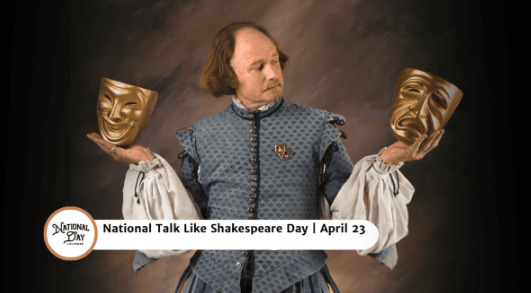


1616 – On this date the English writer and actor William Shakespeare died. He was born in 1564 and baptised on the 26 April, probably within 2 or 3 days of his birthdate. (One legend is that he died on the day that he was born - which would make his birthdate also today, 23 April)
Shakespeare is the most important playwright and poet in the English or any other language, but Shakespeare's sonnets are cited as evidence of his possible homosexuality.
The poems were initially published, perhaps without his approval, in 1609. One hundred and twenty-six of them appear to be love poems addressed to a beautiful young man whom he addresses as 'Fair Lord' or 'Fair Youth'; this is often assumed to be the same person as the 'Mr W.H.' to whom the sonnets are dedicated. The identity of this figure (if he is indeed based on a real person) is unclear; the most popular candidates are Shakespeare's patrons, Henry Wriothesley, 3rd Earl of Southampton and William Herbert, 3rd Earl of Pembroke, both of whom were considered handsome in their youth.
It remains unclear whether the Fair Lord and Fair Youth addressed represent real individuals, or even whether the authorial "I" who addresses them represents Shakespeare himself, though Wordsworth believed that with the sonnets "Shakespeare unlocked his heart".
Even though he married Anne Hathaway and had three children, the circumstantial evidence, such as in his sonnets and plays, suggests he did have an erotic interest in men. Evidence of these homosexual tendencies comes from an analysis of his sonnets, which address his "great love," who seems be a young man.

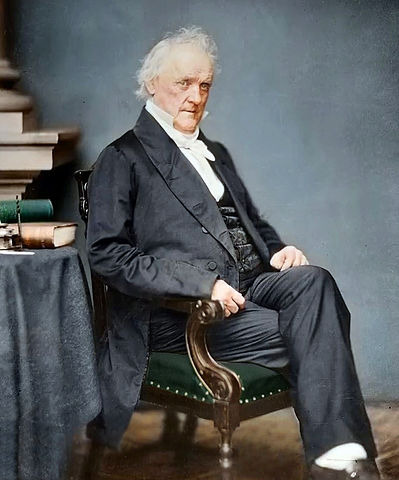
1791 – Today's the birthday of James Buchanan (d.1868), the 15th President of the United States and the nation's only bachelor chief executive, unanimously considered worst president in U.S. history.
For fifteen years in Washington, D.C., prior to his presidency, Buchanan lived with his "close friend," Alabama Senator William Rufus King. King became Vice President under Franklin Pierce. He took ill and died shortly after Pierce's inauguration, and four years before Buchanan became President. Buchanan and King's close relationship prompted the surly Andrew Jackson to refer to King as "Miss Nancy" and "Aunt Fancy," while Aaron V. Brown spoke of the two as "Buchanan and his wife." Further, some of the contemporary press also speculated about Buchanan and King's relationship.
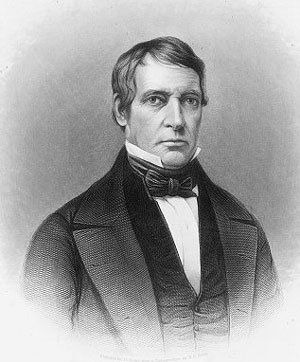
William Rufus King
Buchanan's and King's nieces destroyed their uncles' correspondence, leaving some questions as to what relationship the two men had, but the length and intimacy of surviving letters illustrate "the affection of a special friendship", and Buchanan wrote of his "communion" with his housemate . The circumstances surrounding Buchanan and King's close emotional ties have led most open historians to speculate that he was America's first homosexual president.
Perry Brass wrote us to tell us that in "several cities, most notably Washington, DC, 'James Buchanan Clubs' popped up, joined by wealthy bachelors. The clubs purported to be a place where bachelor men could 'network,' before that word became a verb, but the actual basis of the club was pretty well known: they were clubs for (somewhat) closeted A-gays. Another version of the clubs were called 'Steamboat clubs,' and I'm not sure where that word came from, although I think it had some connection with the Buchanan era as well."
Why was he such a bad president? Well, in a nutshell, most historians consider him responsible for letting the country fall apart into the Civil War. He acquiesced to Southern states (even though he himself was a Pennsylvanian). Buchanan's efforts to maintain peace between the North and the South alienated both sides. As the Southern states declared their secession in the prologue to the American Civil War, Buchanan's opinion was that secession was illegal, but that going to war to stop it was also illegal; hence he remained inactive.
By the time he left office, popular opinion had turned against him and the Democratic Party had split in two. His handling of the crisis preceding the Civil War has led to his consistent ranking by historians as one of the worst Presidents in American history.
If you visit Washington, DC, you can see the lovingly restored cottage of Buchanan's successor (and perhaps the second homosexual President) Abraham Lincoln. Located at the Old Soldiers Home near Rock Creek Park, the cottage underwent a complete renovation to return it to period authenticity as the summer home of the Lincolns during the civil war. What does this have to do with Buchanan? Well, if you stand in the front yard of the Lincoln cottage, across the way you'll see the beautiful cottage that was the summer home to Buchanan and King on those hot steamy Washington summers of long ago.

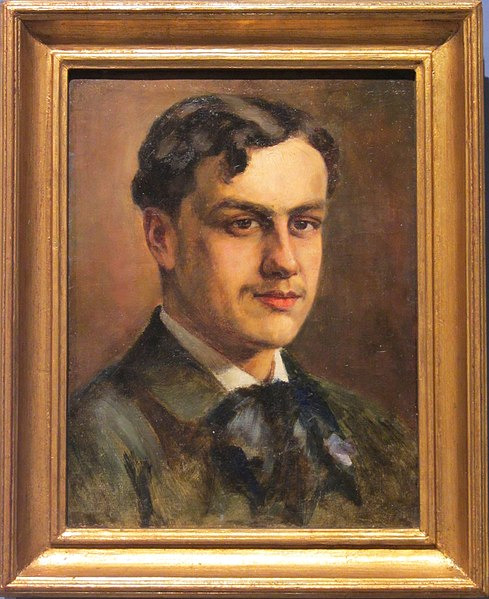
1882 – The Chilean novelist Augusto Goemine Thomson better known as Augusto D'Halmar was born on this date. He is best known as the author of the novel "Pasión y muerte del Cura Deusto" which was published in 1924. It was one of the first novels to deal with homosexuality in an open way. In 1942 D'Halmar was awarded the Premio Nacional de Literatura. He was the first recipient of the honor.


1918 – James Kirkup (d.2009) was a prolific English poet, translator and travel writer. He wrote over 30 books, including autobiographies, novels and plays. He became a Fellow of the Royal Society of Literature in 1962.During World War II he was a conscientious objector, and worked for the Forestry Commission and on the land in the Yorkshire Dales.He taught at The Downs School in Colwall, Malvern, where W.H. Auden had earlier been a master. Kirkup wrote his first book of poetry, The Drowned Sailor at the Downs, which was published in 1947.
In 1952 he moved south to Gloucestershire and became visiting poet at Bath Academy of Art for the next three years. Moving on from Bath, he taught in a London grammar school before leaving England in 1956 to live and work in Europe, the Americas and the Far East. In Japan, he found acceptance and appreciation of his work, and he settled there for 30 years, lecturing in English literature at several universities.
Kirkup came to public attention in 1977, after the newspaper Gay News published his poem The Love That Dares to Speak Its Name, in which a Roman centurion describes his lust for and attraction to the crucified Jesus. The paper was successfully prosecuted in the Whitehouse v. Lemon case, along with the editor, Dennis Lemon, for blasphemous libel under the 1697 Blasphemy Act, by Mary Whitehouse, then Secretary of the National Viewers' and Listeners' Association.
You can read the poem here: The Love That Dares To Speak Its Name

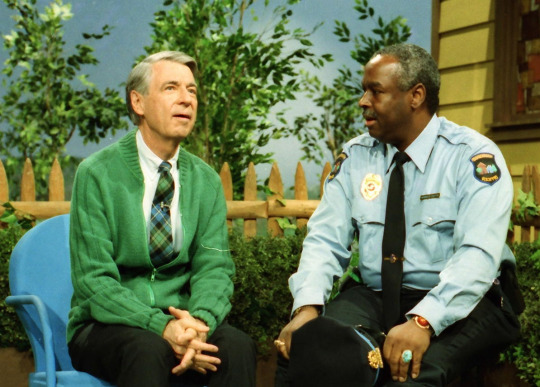
Mister Rogers with Officer Clemmons
1945 – François Clemmons is an American singer, actor, playwright and university lecturer. He is perhaps best known for his appearances as "Officer Clemmons" on the PBS television series Mister Rogers' Neighborhood from 1968 to 1993.
Clemmons was born in Birmingham, Alabama and raised in Youngstown, Ohio. When it was discovered that he had an excellent singing voice, he began performing locally at church functions. He became choir director of his church at the age of 10. His first songs were the spirituals of pre-Civil War America, passed down to him by his mother. He soon branched out across genres, singing with various community groups. For a while, he was the lead singer of a rock 'n' roll group called the Jokers.
Clemmons received a Bachelor of Music degree from Oberlin College, and a Master of Fine Arts from Carnegie Mellon University. He also received an honorary degree of Doctor of Arts from Middlebury College.For 25 years, Clemmons performed the role of Officer Clemmons, a friendly neighborhood policeman, in the "Neighborhood of Make-Believe" on the children's television show Mister Rogers' Neighborhood. In the neighborhood itself, Clemmons ran a singing and dance studio located in the building diagonally across the street from Mister Rogers' house. He was one of the first African Americans to have a recurring role on a kids' TV series, and his presentation – as both a beloved neighbor to Mister Rogers and as a respected authority figure – has been described as a ground-breaking message in race relations.
While attending Oberlin College, Clemmons realized that he was gay, but remained closeted, fearing disapproval from his religious family and the community. In 1968, Fred Rogers told Clemmons that while his sexuality did not matter to him personally, Clemmons could not be "out" and continue appearing on Mister Rogers' Neighborhood, because of the scandal that would arise. In the late 1960s, Rogers and others suggested that Clemmons get married as a way to deal with his sexual orientation, which he did. His marriage to wife Carol did not work out, and Clemmons divorced in 1974 so that he could live openly as a gay man. Rogers remained personally supportive of Clemmons, but required him to avoid any indication of his homosexuality – such as the earring he began to wear as a signifier – on the program.
Clemmons lives and works in Middlebury, Vermont, where he is the Emeritus Artist in Residence of Middlebury College. He is a member of Phi Mu Alpha Sinfonia, the national fraternity for men in music.


1957 – Alex Sanchez's unique background as a youth and family counselor and his experiences as an immigrant have helped make him an important voice in today's young adult glbtq literature canon. Born in Mexico City, Mexico, to parents of both Cuban and German descent, Sanchez immigrated with his family to Texas in 1962 at the age of five.
In a panel discussion at the 2003 National Council of Teachers of English convention, he explained, "Because of my light-skinned father and his German last name (not Sanchez), I learned I could pass as white. I could hide who I was, so that others would like and accept me."
At age 13, Sanchez realized that he was gay. He once again experienced feelings of being an outsider. But this time he felt there was no one he could talk to or relate to. He found no books in the library that described what he was going through, and none to tell him that what he felt was okay.
"So," he explained, "just as I had learned to hide that I was Mexican, I tried to hide that I was gay. I became depressed, quiet, invisible, trying to escape calling attention to myself."
After graduation, he worked as a family and youth counselor for ten years. During that time, he began to write the story that would eventually become Rainbow Boys (2001).
The book features three distinct and well-developed gay teens: an "out-and-proud" gay activist, a jock who starts the book with a girlfriend and family issues, and a low-key closeted teen who experiences prejudice due to his friendship with the more flamboyant character. The characters' stories are continued in Rainbow High (2003) and Rainbow Road (2005).
Considering that the average age most gay Americans now "come out" has dropped from age 21 (in 1979) to around 15 today (and as low as ten), the need for middle-grade glbtq fiction is obvious.
Alex Sanchez is one of today's most influential authors for the glbtq young adult market. His popularity and success is due to many factors, but most notably his believable characters, the timely and relevant storylines of his novels, and the broad appeal of the stories to both gay and straight teens.
Sanchez's books have helped countless gay teens accept themselves while at the same time helping straight readers understand and empathize with gay teens.


1984 – Aras Onur is a Turkish author, poet, and columnist.
Aras Onur was born in Ankara and is a graduate of TED Ankara College and University of Ankara. He started his literary career in the early 2000s. Openly gay, he has been often associated with local LGBT literature.
He is often identified as a socialist in the media, although his conservative tendencies are also often noted. Aras Onur was mastermind of "Kindle a Candle" protests, a wave of civil unrests in Turkey which began on 11 September 2015. The protesters were spurred on by a manifesto released by columnists of the national newspaper Karsi, in which the slogan "Kindle a Candle, Stand Out" was featured.
Onur had written Karsi editorial columns for two years as the acting-editor until he resigned from office in October 2016, following a ban on accessing the paper's website.


1984 – The US Dept. of Health and Human Services Secretary holds a press conference announcing that the virus that causes AIDS has been discovered: it’s HTLV-3, known today as HIV ('human immunodeficiency virus'). AIDS was originally named called GRID – 'gay related immune deficiency'.


2013 – The French Senate approves same-sex marriage.


14 notes
·
View notes